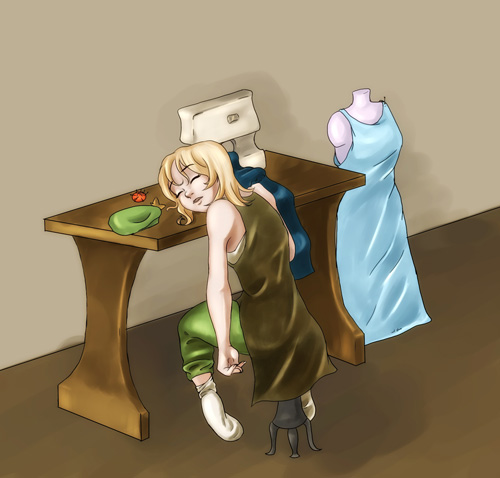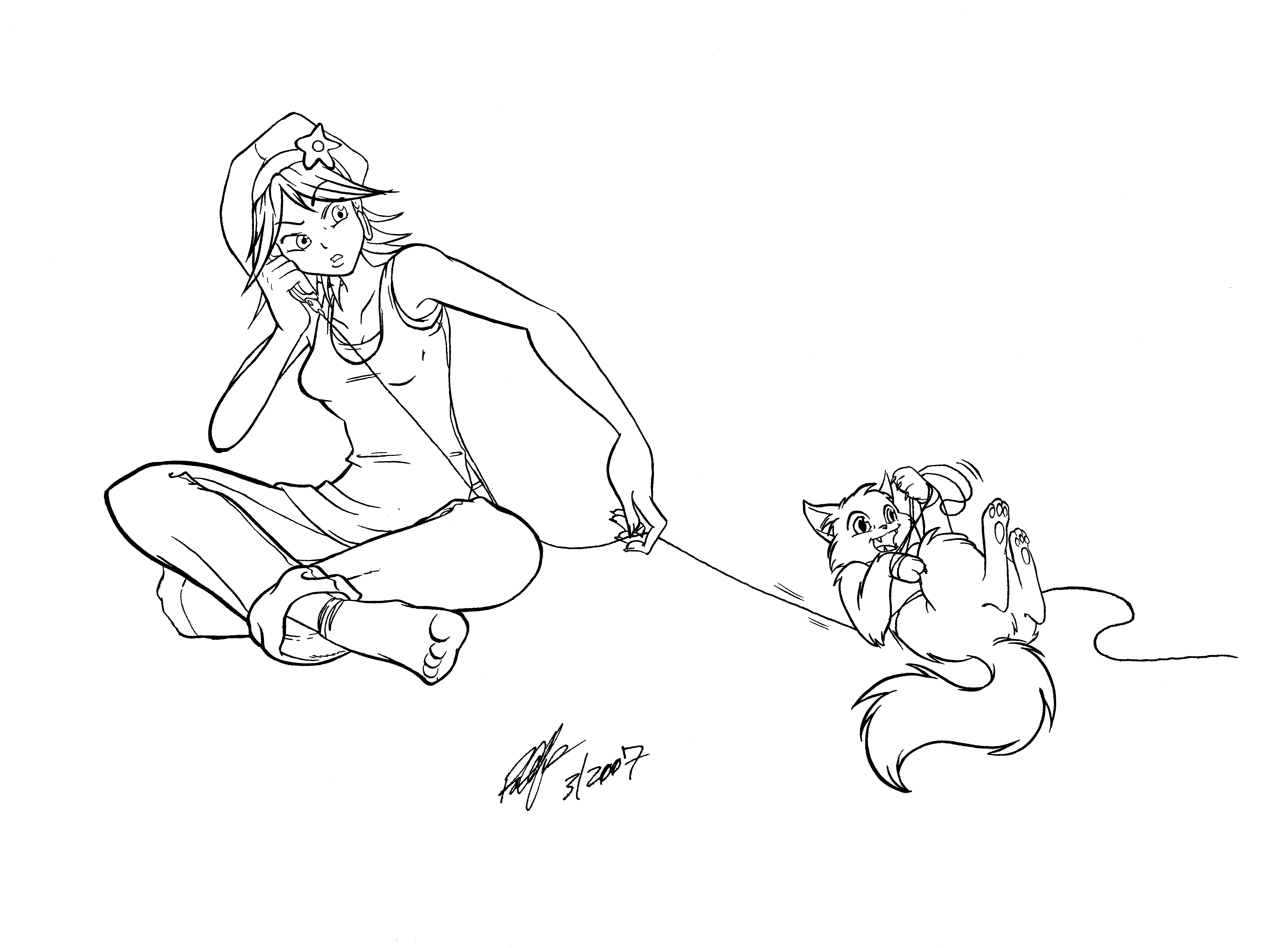Now cosplay is an extremely personal and individual creation. I won't claim to be an expert, but I've been around, done my own costumes, and generally enjoyed the experience. Cosplay can be a lot of fun and a lot of hard work, and it's up to you how you balance the two. I've seen costumes that took a year to make and costumes that were created over the week beforehand (or the night before).
Some of my advice might seem obvious, some might make the reader go "duh" in retrospect. In writing the column to be helpful for the general reader, it's necessary to start at the beginning. If you already enjoy cosplay a lot, I suggest you check out cosplay.com , where there seems to be an expert in every aspect of costuming, from making your eyes look Japanese to the intricacies of how to sew with different materials. And never underestimate the help of a crafty family member. Sure, they might look at you funny, but plenty of parents, grandparents, and others are happy to help out.
The History of Making Excuses to Wear Costumes when It's Not Halloween
As anime cons made their way into America back in the 80s, cosplay was immediately a popular event. Cosplay is the name used by otakus to distinguish it from that of a Masquerade, which is the typical term for the costume events at a science-fiction or comic con.
Masquerades often served as the only event where people were in costume, and the rest of the weekend would be filled with "normal" clothing. This difference in costuming attitudes is one of the reasons for the name distinction. Cosplayers at an anime convention often also hold themselves to a higher standard of acting in character, a trait that was brought over from Japanese counterparts.
So in other words, the term cosplay only refers to costumes related to Japanese medias, or at least that's how the most serious cosplayers define it. I've seen long debates break out on message boards about what exactly is allowed as part of cosplay. Some people will go so far as to say that video games, even when based on games from Japan like Zelda or Super Mario Brothers, are not permitted in the cosplay events. The term cosplay is beginning to creep into the general lexicon as a word that just means dressing in costume, and every year I see more and more cosplayers at anime conventions dressed as American creations.
Most actual cosplay events do place standards on the costumes, meaning they have to have something to do with anime. While it might be fun to wear your Harry Potter costume around the con (and I saw a wonderful Harry Potter cosplay group at Anime Expo once), those wouldn't be acceptable entries in the actual cosplay events. We may see a lessening in the stringency of these rules over the coming years as arguments for shows like Avatar are made. It will also depend on the focus of the event—some are more focused on anime in America, while others keep to a more traditional "anime is only from Japan" approach.

By Nightambre
Get ready, get set… start sewing all night long!
Okay, next I'm going to go into some of the basics of different steps used to put together your costume, from tackling a pattern to thrift store scavenging (my personal favorite--almost all my costumes are recreated from thrift store clothes). I would love to read extra advice in the comments; I know plenty of knowledgeable people hang out on theOtaku. If you want to post more detailed cosplay advice on your theOtaku Worlds or myOtaku, please let me know, and I'd be happy to link to you.
Navigating Corporate Interests :: Otaku the World P4
All right, here is the final column on making a difference as an otaku. Sorry about the lateness, life decided to hit me with lots to do, as well as taking away my internet for a week.
Navigating Corporate Interests
Communicating with companies comes with its own set of headaches. Unlike conventions, it's not quite as easy to get involved yourself, though future career plans can come out of a desire to bring a change to the industry. Most of the time, the way to enact change is to write a lot of letters, gather together people who feel the same way, and simply make a polite pest of yourself. There's a fine line between being effective and being obnoxious, and you'll have to do your best to walk it.
The first place to start is with a good plan of what you want to accomplish. I've been having some good PM discussions with a member of theOtaku about bringing anime movies to local movie theaters, so let's use that as an example. The problem is that the local/small town theaters aren't getting movies like Howl's Moving Castle, even though they're being distributed to some bigger theaters. So first step is to contact the local theaters and express an interest in them putting on a viewing of the movie, even if it's only a limited engagement of a week or a night. Since this is a local issue, it's probably more effective to go to the theater and talk to the manager than to write a letter. It's much harder to say no to or ignore a person face to face than with a letter.
From talking with a manager or owner, we can then decide where the problem lies. Is the movie theater owned by a corporation or is it completely local? How do they get their movies? Most movie theaters are owned by a larger corporation, even if they may not appear to be. When this is the case, just talking to the manager isn't going to be enough. The local manager may very well not be getting the choice to show the movies to begin with. That's why you need to start writing to the company in charge and ask for them to give your local theater or area the choice to view these movies. This step will take patience, and the more people you can get involved, the better. Remember that your local anime clubs and conventions can be a great way to meet like-minded people. You can even meet others who might have done a similar campaign in their hometown. The internet likewise serves as a place to meet others and find out how they've changed things. Since many companies are national, you might find someone else who dealt with the same company in a different part of the country.
The above example also holds true for most contact with a store, TV channel, etc. Many of the places you interact with in your daily life are owned by a larger corporation or have their distribution determined by someone else. Still, the local people do have some say, and making your opinion known to them is crucial, because they're interacting with the parent companies as well.
As soon as you make a difference, get that anime viewing at the local theater or convince the cable company to carry a new channel, make sure you throw your own promotion efforts into it as well. Tell all your friends, all the local high schools and colleges, and make sure that everyone who might be interested shows up. The more money you can make for that company, the more interested they will be in bringing more of the same kind of thing into the area.

By Bee
Starting a revolution can involve a lot of time on the phone.
Promote Your Interests Throughout Your Daily Life
Finally, you never know when your interests are going to make a difference. Not only do you want to get the corporations to take note, but you also want to let those around you know there's something cool they're missing out on. The more vocal you are about your interests, the more likely you are to give other people something new to try or to find out that the cheerleader in the corner is also totally addicted to Shojo Beat. Allies are always helpful in getting your point across.
On a smaller scale, you might not even be that interested in changing what the corporations do or what events your local anime convention hosts. Instead, you might just want manga recognized as a literary form at your school. I've always been very vocal about my interests in anime and shifted many a school project towards an anime focus. I've had teachers who thought anime and manga were the lowest forms of media, down there with soap operas, and others who appreciated a different cultural look on pop culture. Experiment and try to bring your interests out where you can in life. It's useful to not only change the opinions of big corporations, but to also change how the rest of America sees anime. The more mainstream it gets (I know, some people want to see it stay a sub-culture geek thing… but…), the more companies are going to give us options in our viewing and merchandise. In Japan, manga and anime are such broad terms that it's like saying "I like TV, I like books," and the more mainstream it gets over here, the more new companies are going to give us choices in what we see. Even with all the fansubbers and scanlators out there, we only see a fraction of the choices.
Hopefully over the last month's articles I've helped you learn a bit about the current industry, how to go about affecting change within conventions and corporations, and how to give effective criticism. I know everyone won't agree about fansubs or the correct method for becoming involved, but that's because there are no easy answers. My goal is to open your eyes to the other side, give my readers a starting point for their own journeys.
Next time I plan to talk about cosplay. Feel free to ask questions now or as next month goes on, and I will try to cover those questions. As always, archives of my columns are up on the Otaku Survival Guide website.
This is the last column for now on changing the world, otaku style. Sorry it was so long in coming, but life kind of hit my with a couple of conventions, way too much homework, no internet, and well, general life stuff. Enjoy!
Navigating Corporate Interests
Communicating with companies comes with its own set of headaches. Unlike conventions, it's not quite as easy to get involved yourself, though future career plans can come out of a desire to bring a change to the industry. Most of the time, the way to enact change is to write a lot of letters, gather together people who feel the same way, and simply make a polite pest of yourself. There's a fine line between being effective and being obnoxious, and you'll have to do your best to walk it.
The first place to start is with a good plan of what you want to accomplish. I've been having some good PM discussions with a member of theOtaku about bringing anime movies to local movie theaters, so let's use that as an example. The problem is that the local/small town theaters aren't getting movies like Howl's Moving Castle, even though they're being distributed to some bigger theaters. So first step is to contact the local theaters and express an interest in them putting on a viewing of the movie, even if it's only a limited engagement of a week or a night. Since this is a local issue, it's probably more effective to go to the theater and talk to the manager than to write a letter. It's much harder to say no to or ignore a person face to face than with a letter.
From talking with a manager or owner, we can then decide where the problem lies. Is the movie theater owned by a corporation or is it completely local? How do they get their movies? Most movie theaters are owned by a larger corporation, even if they may not appear to be. When this is the case, just talking to the manager isn't going to be enough. The local manager may very well not be getting the choice to show the movies to begin with. That's why you need to start writing to the company in charge and ask for them to give your local theater or area the choice to view these movies. This step will take patience, and the more people you can get involved, the better. Remember that your local anime clubs and conventions can be a great way to meet like-minded people. You can even meet others who might have done a similar campaign in their hometown. The internet likewise serves as a place to meet others and find out how they've changed things. Since many companies are national, you might find someone else who dealt with the same company in a different part of the country.
The above example also holds true for most contact with a store, TV channel, etc. Many of the places you interact with in your daily life are owned by a larger corporation or have their distribution determined by someone else. Still, the local people do have some say, and making your opinion known to them is crucial, because they're interacting with the parent companies as well.
As soon as you make a difference, get that anime viewing at the local theater or convince the cable company to carry a new channel, make sure you throw your own promotion efforts into it as well. Tell all your friends, all the local high schools and colleges, and make sure that everyone who might be interested shows up. The more money you can make for that company, the more interested they will be in bringing more of the same kind of thing into the area.

By Bee
Starting a revolution can involve a lot of time on the phone.
Promote Your Interests Throughout Your Daily Life
Finally, you never know when your interests are going to make a difference. Not only do you want to get the corporations to take note, but you also want to let those around you know there's something cool they're missing out on. The more vocal you are about your interests, the more likely you are to give other people something new to try or to find out that the cheerleader in the corner is also totally addicted to Shojo Beat. Allies are always helpful in getting your point across.
On a smaller scale, you might not even be that interested in changing what the corporations do or what events your local anime convention hosts. Instead, you might just want manga recognized as a literary form at your school. I've always been very vocal about my interests in anime and shifted many a school project towards an anime focus. I've had teachers who thought anime and manga were the lowest forms of media, down there with soap operas, and others who appreciated a different cultural look on pop culture. Experiment and try to bring your interests out where you can in life. It's useful to not only change the opinions of big corporations, but to also change how the rest of America sees anime. The more mainstream it gets (I know, some people want to see it stay a sub-culture geek thing… but…), the more companies are going to give us options in our viewing and merchandise. In Japan, manga and anime are such broad terms that it's like saying "I like TV, I like books," and the more mainstream it gets over here, the more new companies are going to give us choices in what we see. Even with all the fansubbers and scanlators out there, we only see a fraction of the choices.
Hopefully over the last month's articles I've helped you learn a bit about the current industry, how to go about affecting change within conventions and corporations, and how to give effective criticism. I know everyone won't agree about fansubs or the correct method for becoming involved, but that's because there are no easy answers. My goal is to open your eyes to the other side, give my readers a starting point for their own journeys.
Next I plan to talk about cosplay. Feel free to ask questions now or as next month goes on, and I will try to cover those questions. As always, archives of my columns are up on my website .
One of the most underrated skills online, in my opinion, is that of giving effective feedback. Critique vs. criticism, feedback vs. "you suck." Anyone who's ever put their creative works and heart and soul out there on the internet or in real life probably has a few stories about bad experiences with a less than helpful reviewer. So this week I'm going to focus on feedback. Now, I'm talking about it in the sense of giving conventions and corporations feedback about the products and events that you like or that you think can be improved. Still, these pointers apply to artists, writers, or co-workers, and remember, when you talk to conventions and corporations, there are real people on the other end who are getting your feedback.
Giving Effective Feedback
Feedback can be a very effective tool, when given in a coherent and comprehensive manner. Sometimes by being the first one to speak up, you can encourage others with the same opinions to speak up as well. Many conventions host wrap-up panels at the convention itself as well as posting a comments thread on their message board. Use these venues to let the convention know what you thought. Just make sure what you're telling them is productive and useful. Also, scan through the previous comments to see what others have said; someone may have touched on the subject already. Which isn't to say you shouldn't add your opinion, but by building off of their comment, you encourage that person to keep posting as well as unify the fact that multiple people were upset. We'll talk a little more about what's useful to complain about and what will be ignored later on when we talk more about conventions.

By Bee
For example, critiquing like that will may cause the person to never try again. At the very least, it will most likely make them so angry they don't want to consider anything you say, even if you might have some valid points.
Likewise, this can work for companies , as many host message boards or post their e-mail address. There's some argument among letter writers about whether it's more effective to send an e-mail or a letter. An e-mail can promote a dialogue between you and the representative as well as be a quicker read, but it runs the risk of being overlooked or not taken seriously. A letter these days can be seen as overly formal to some, but it does give you the appearance of being more serious about the matter, since it takes more energy to write out a letter, print, and mail it than to simply send off an e-mail. Either format can be effective, though if you've got an actual petition I personally think a hardcopy with signatures looks more formal and imposing that just an e-mailed list. Also, don't overlook the value of a phone call in some cases.
When dealing with corporations, you will most likely have to write many letters and make phone calls when you can. The first step will be tracking down the chain of command and figuring out who actually has the power to make the changes you want. If your trying to get more anime into your local theater or more manga into the bookstore, you may very well find out that their order decisions are limited by those above them. Still, making your concerns known to the local people is a good step, as you might find that some of them are sympathetic to your cause and willing to join in your fight. For example, most of the bookstores I've been to that had excellent and well-stocked manga selections had those because there was a staff member who liked manga. It works for any genre or product, that if there is a staff member that appreciates it, they will make sure the section is the best it can be. Even the staff at your local Barnes and Noble does have a limited amount of control over what goes on to their shelves. It's far more limited than that of someone at an independent store, but they do have some power.
One thing you should always remember when giving feedback is to start with something positive. There must be something you like about the event/company, or else you wouldn't be bothering to try to improve them. Saying something like "I admire the quality of anime programming that you are bringing to movie theaters across the country and would like to see more titles offered to my local theaters." Is a much better way to start out than just saying "Why aren't we getting any anime in my small town?" By starting on a positive note, you immediately let them know that they are doing things that you really like, and therefore it makes them more receptive to your criticism. People tend to get defensive if they just hear a complaint and are much more likely to disregard your comments as just you not understanding their vision or intent.
I hope you enjoyed this week's discussion and that it will be useful in your daily life, as we all end up in situations where giving feedback is necessary and useful. Next week I'll be covering how conventions are run for the fans and hopefully giving you a bit of insight into the workings of your local convention. Feel free to leave questions here.
In response to Fasteriskhead’s essay "Anime Companies and Otaku - Another Look"...
Read the full post »



